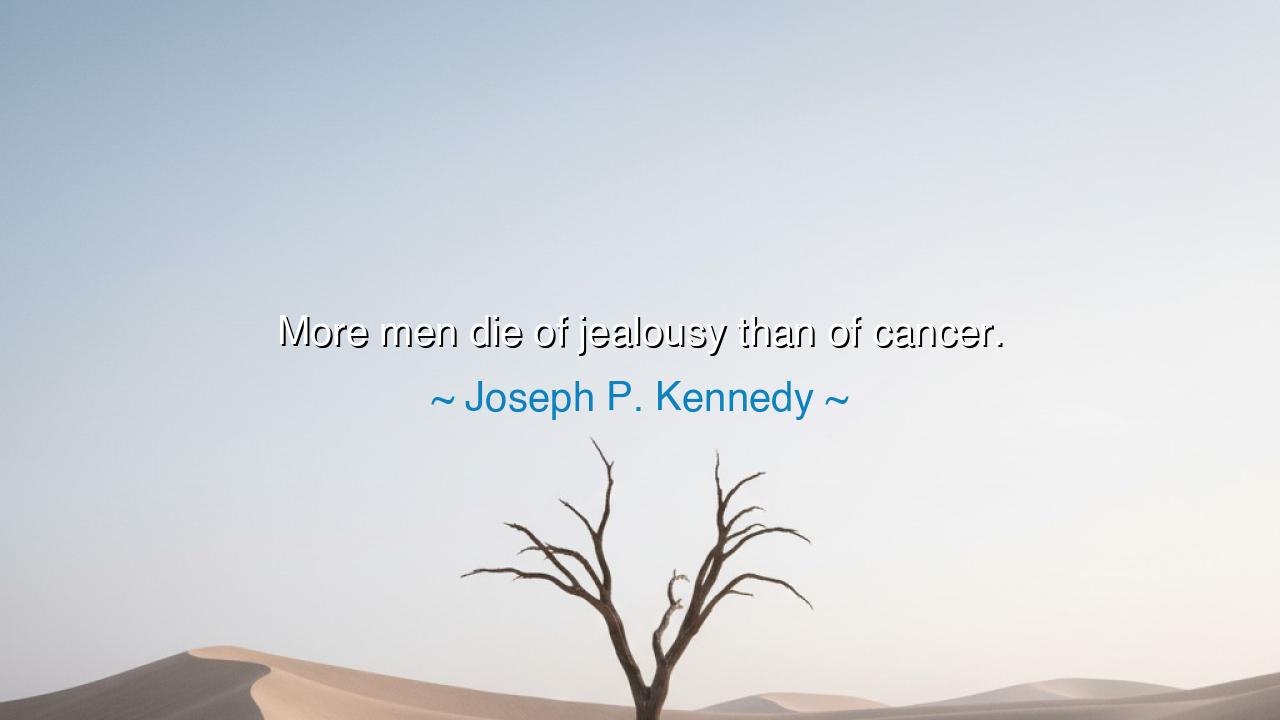
More men die of jealousy than of cancer.






Hearken, children of reflection, and heed the words of Joseph P. Kennedy, a man attuned to both the affairs of men and the frailties of the human heart: “More men die of jealousy than of cancer.” Let these words strike the spirit, for they reveal a truth both profound and ancient. Though illness may claim the body with relentless certainty, it is jealousy, that hidden fire of envy and suspicion, which can consume the soul, distort the mind, and ultimately bring ruin upon both heart and life.
Jealousy is a stealthy adversary. Unlike sickness, it begins subtly, often unrecognized, as a whisper in the mind, a pang in the heart, a shadow over the eyes. It twists perception, turning friendship into rivalry, love into suspicion, and success into threat. The danger lies not merely in its presence, but in its persistence: it festers, gnaws, and spreads its poison through thought and deed, ultimately crippling the spirit more cruelly than any disease.
History bears testament to this peril. Recall the tale of King Saul and David, in the annals of Israel. Saul, once noble and revered, was overtaken by jealousy at the rise of the young shepherd David, whose valor and favor with the people threatened his pride. In his envy, Saul became paranoid, cruel, and unwise, sending his kingdom into turmoil and sowing fear and sorrow throughout his household. Though his body remained alive, the corrosive fire of jealousy devoured his peace, his reason, and his legacy, a reminder that the mind’s poisons can be deadlier than the ailments of flesh.
Even in more recent times, consider the fraternal conflicts among the sons of the Roman Empire or the tragic rivalries of political dynasties. Ambition, envy, and jealousy have toppled emperors and kings, caused betrayals among brothers, and shattered alliances, all long before disease could lay claim to the body. Joseph Kennedy’s observation echoes through these ages: men may face cancer, plague, and sword, yet it is the insidious malady of envy that more often brings ruin, both moral and mortal.
The danger of jealousy lies in its subtlety. One does not notice it as one notices illness; one does not call for healers when it takes hold. Its symptoms are hidden in restless thoughts, sleepless nights, and bitter words. Relationships falter, decisions sour, and opportunities are lost as the heart becomes a battlefield of envy and resentment. The ancients understood this: they warned that unchecked envy is a slow death, claiming not only those who harbor it but those whom it seeks to harm, spreading calamity like a silent pestilence.
Yet, the wisdom of ages also provides remedy. To guard against jealousy, one must cultivate contentment, gratitude, and discernment. Reflect upon the blessings of one’s own life, honor the achievements of others, and recognize that another’s success is not a theft of one’s own potential. By embracing humility and self-awareness, one can quench the flames before they consume the spirit, preserving both peace of mind and the vitality of the heart.
Practical guidance emerges from this reflection: when jealousy stirs within, observe it, name it, and release it. Communicate openly with those around you, focus on personal growth, and seek collaboration rather than rivalry. Meditate upon your own strengths, set goals rooted in virtue, and allow the admiration of others to inspire rather than wound. In doing so, one transforms envy from a corrosive force into motivation, preserving life’s health and harmony.
Therefore, generations to come, remember Joseph Kennedy’s warning: while bodies may succumb to the ailments of flesh, the heart is more perilously wounded by jealousy. Guard it diligently, nurture trust and compassion, and walk the path of clarity and contentment. By mastering envy, you protect not only your life but the lives of those you love, ensuring that your days are not cut short by the silent, deadly fire of the heart.
If you wish, I can also craft a more poetic, mythic version of this reflection where jealousy is depicted as a literal consuming flame, for a version suitable for meditation or dramatic narration. Do you want me to do that?






AAdministratorAdministrator
Welcome, honored guests. Please leave a comment, we will respond soon